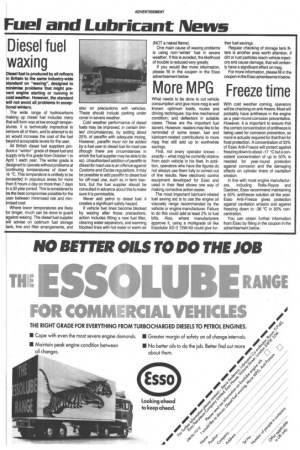Diesel fuel waxing
Page 41

If you've noticed an error in this article please click here to report it so we can fix it.
Diesel fuel is produced by all refiners in Britain to the same industry-wide standard on "waxing", designed to minimise problems that might prevent engine starting or running in cold weather. However, the standard will not avoid all problems in exceptional winters.
The wide range of hydrocarbons making up diesel fuel includes many that will form wax at low enough temperatures. It is technically impractical to remove all of them, and to attempt to do so would increase the cost of the fuel beyond acceptable levels for the user.
All British diesel fuel suppliers produce a "winter" grade of diesel fuel and supply only this grade from October 1 to April 1 each year. The winter grade is designed to operate without problems at 'continuing temperatures of down to -9 °C. This temperature is unlikely to be exceeded in populous areas for more than 8 hours a day on more than 7 days in a 30 year period. This is considered to be the best compromise possible for the user between minimised risk and minimised cost.
Where lower temperatures are likely for longer, much can be done to guard against waxing. The diesel fuel supplier will advise on optimum fuel storage tank, line and fitter arrangements, and also on precautions with vehicles. These should include parking under cover in severe weather.
Cold weather performance of diesel fuels may be improved, in certain limited circumstances, by adding about 25% of paraffin with adequate mixing. However, paraffin must not be added by a fuel user to diesel fuel for road use (though there are circumstances in which the fuel supplier may be able to do so). Unauthorised addition of paraffin to diesel for mad use is an offence against Customs and Excise regulations. It may be possible to add paraffin to diesel fuel for off-road use, such as in farm tractors, but the fuel supplier should be consulted in advance about this to make sure it is permissible.
Never add petrol to diesel fuel: it creates a significant safety hazard.
If vehicle fuel lines become blocked by waxing after these precautions, action includes fitting a new fuel filter, clearing water separators, and warming blocked lines with hot water or warm air (NOT a naked flame).
One main cause of waxing problems is using non-`winter fuel in severe weather. If this is avoided, the likelihood of trouble is reduced very greatly.
If you would like more information, please fill in the coupon in the Esso advertisement below.
































































